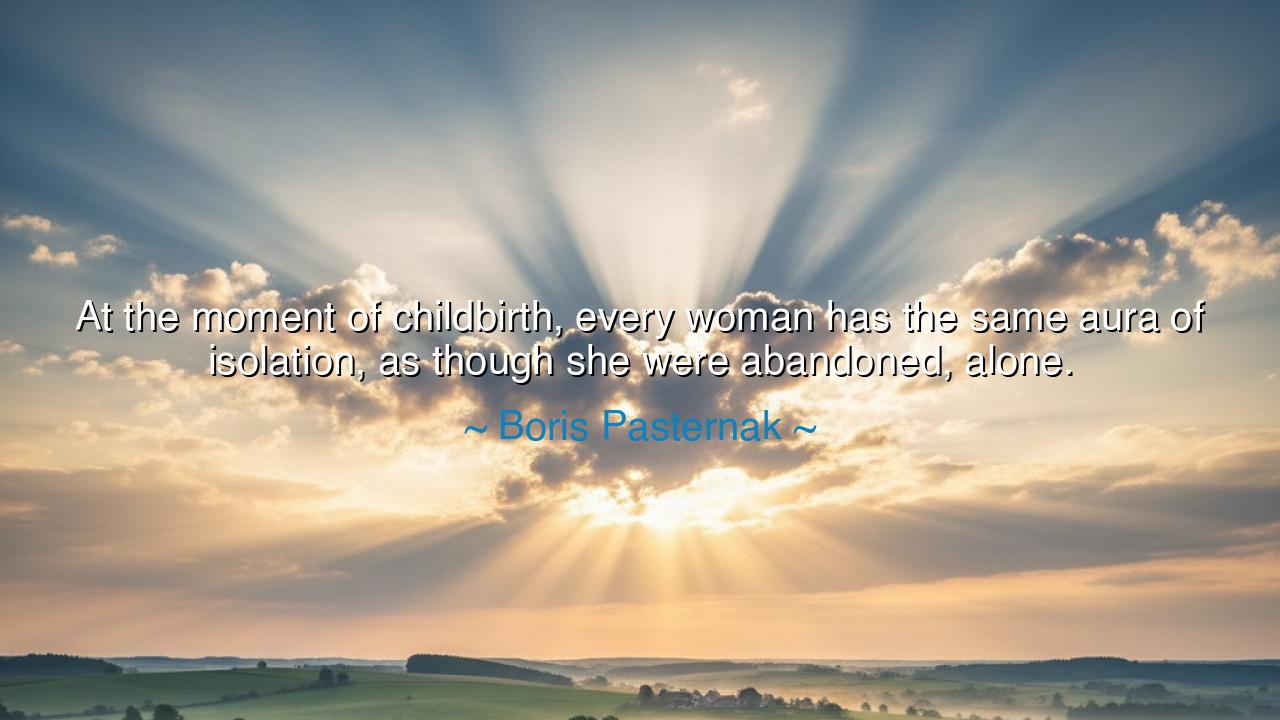
At the moment of childbirth, every woman has the same aura of
At the moment of childbirth, every woman has the same aura of isolation, as though she were abandoned, alone.






“At the moment of childbirth, every woman has the same aura of isolation, as though she were abandoned, alone.” — thus wrote Boris Pasternak, poet, philosopher, and author of Doctor Zhivago, a man who saw in human life both its terrible loneliness and its divine grandeur. In this single sentence, Pasternak unveils a truth that transcends the act of birth itself. He speaks not only of the solitude of the mother, but of the profound aloneness that surrounds every moment of creation, every passage between what was and what is to come. For in the instant that life begins, there is both the miracle of connection and the mystery of separation — the soul entering the world through a gate that no other can pass beside it.
The origin of this quote can be traced to Pasternak’s reflections on human destiny and the cost of creation. Living amid revolution and exile, he came to see that all acts of true creation — whether in art, faith, or life itself — are born in solitude. Childbirth, in his eyes, was the most vivid symbol of this truth: the mother, surrounded by others, yet utterly alone in the sacred ordeal of bringing forth life. No midwife or physician, no husband or friend, can enter that inner chamber of pain and wonder. In that moment, she stands between two worlds — the eternal and the temporal, death and birth, silence and cry — and she alone bears the crossing. Thus, Pasternak’s words remind us that creation, though universal, is profoundly individual.
This “aura of isolation” is not despair; it is the solitude of transformation. Every soul that gives birth — to a child, to an idea, to a new self — must face the moment when help cannot reach it. The mother’s isolation mirrors the solitude of every artist before the canvas, every soldier on the battlefield, every pilgrim in the desert of faith. It is the solitude of the spirit before the infinite. In that moment, there is no crowd, no comfort, only the beating heart and the mystery of becoming. And yet, through that loneliness, life itself is born. Pasternak teaches us that the pain of isolation is the doorway to creation.
Consider the story of Marie Curie, who labored for years in a cold shed, refining pitchblende to discover the glow of radium. Surrounded by doubt, dismissed by the scientific world of her time, she worked in near-total isolation — her mind, her will, her hands, the only allies she possessed. When her discovery at last illuminated the darkness, it was as though a new kind of birth had taken place — one born from solitude and struggle. Her “aura of isolation,” like that of Pasternak’s mother in childbirth, was not emptiness but intensity — the stillness before revelation. From such solitude arises all that reshapes the world.
There is also a sacredness in this solitude. To be alone in creation is to stand before the divine without intermediaries. The woman in childbirth feels not only pain, but a cosmic presence — the same pulse that shaped the stars now passes through her flesh. So it is with all who labor to bring something new into being: they stand momentarily outside the circle of ordinary life, touched by something both fearsome and holy. The loneliness is not abandonment; it is consecration. The world withdraws so that the mystery may unfold without witness.
And yet, when the ordeal passes, connection is restored. The mother, holding her newborn, finds that her solitude has given birth to communion. The artist, after long silence, shares his vision with others. The seeker, after walking alone through doubt, returns to teach what faith truly means. This is the paradox of Pasternak’s insight — that the path to unity always begins in aloneness. One must be stripped of all comfort to discover what truly binds us. Creation and isolation are twins, and through their union, life renews itself.
The lesson, then, is both humbling and ennobling: do not fear the solitude that precedes creation. When you feel abandoned in your struggle — whether to build, to heal, to understand, or to love — remember that this loneliness is not punishment but preparation. The seed must lie alone in the dark before it can bloom. The mother must endure pain before she can hold her child. The soul must face itself before it can embrace the world. Let your moments of isolation become sanctuaries of becoming.
So let the words of Boris Pasternak echo through your heart: “At the moment of childbirth, every woman has the same aura of isolation.” Know that this truth belongs to all who labor to bring forth life in any form. When you stand alone in your darkness, when the struggle seems endless and unseen, remember — you are on the threshold of creation. The solitude you feel is the silence of the universe holding its breath, waiting for you to give birth to something new.






AAdministratorAdministrator
Welcome, honored guests. Please leave a comment, we will respond soon